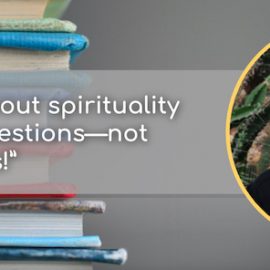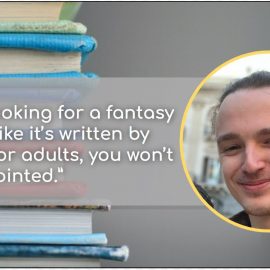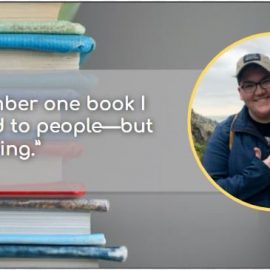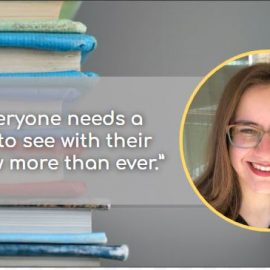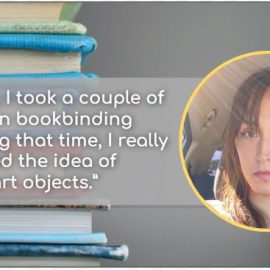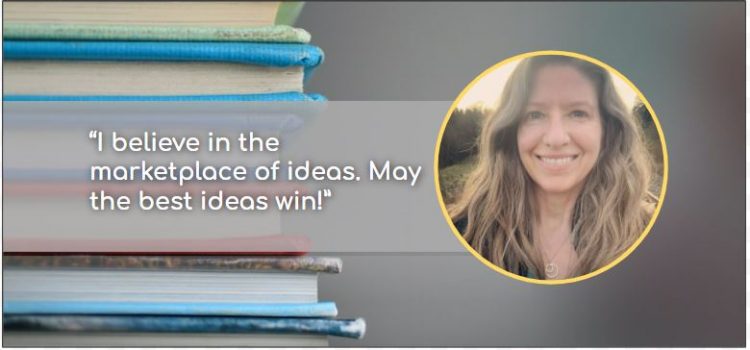
What are some of the best idea-driven books? What’s so great about C. S. Lewis? What movie is just as good as the book?
Elizabeth could tell you. Based in the Northwoods of Wisconsin, she’s a blog writer at Shortform. We interviewed her recently to learn a bit about her love-love relationship with books.
Our Interview With Elizabeth
Elizabeth has broad reading tastes, and she’s even made up her own genre.
What kind of work do you do at Shortform?
I’m a content marketer and blog writer on the SEO team. I perform keyword research, turn excerpts of Shortform’s book guides into blog articles, and write topical articles for the blog.
What’s your favorite book and why?
The Bible has always been my favorite book. As the Bible is actually a collection of writings, I would say that my favorite book of the Bible is Genesis. It tells us how everything is supposed to be—and will be again, it explains how the world got so messed up, and it tells us how everything will be made right and perfect again one of these days.
What are you reading these days?
I read the Bible every day, in the form of the Daily Audio Bible, which goes through the whole Bible every year. I’ve done it for the last several years. In the same vein, I listen to audiobooks, which wonderfully include material from The Great Courses. I recently listened to Greece and Rome: An Integrated History of the Ancient Mediterranean by Robert Garland. Now I’m reading Analysis and Critique: How to Engage and Write about Anything by Dorsey Armstrong. I’m also going through Against the Flow: The Inspiration of Daniel in an Age of Relativism by John C. Lennox. Next, I plan to read Art of Teaching: Best Practices from a Master Educator by Patrick N. Allitt.
If you could have a dinner party with any three authors—dead or alive—who would they be and why?
I’d like to enjoy dinner with Sir Isaac Newton, C. S. Lewis, and Sir Winston Churchill. They each had a brilliant mind, deep thoughts, and an incredible life. Also, I would love to see them interact!
What’s your favorite genre? Why does it intrigue you?
I’m going rogue here and creating my own genre. I enjoy anything with deep, important ideas. That includes novels such as The Strange Case of Dr. Jekyll and Mr. Hyde, The Picture of Dorian Gray, To Kill a Mockingbird, and The Lion, the Witch and the Wardrobe; Stephen Hawking’s science-philosophy book The Grand Design; and C. S. Lewis’s theological work Mere Christianity. Essentially, I love anything that makes me think deep thoughts about important matters.
Are there any book genres or tropes that you dislike or refuse to read?
I’ve never even picked up a romance novel. I’m not a fan of fantasy or sci-fi, although I’ve enjoyed a few that were philosophical and well-written. Dystopian novels turn my smile upside-down. And, I generally steer clear of self-help books, as so many of them promote a self-centered philosophy, which I believe is destructive. That’s not to say that there are some excellent ones, though, and I’d definitely recommend a few, such as The 7 Habits of Highly Effective People.
What’s your favorite way to read a book?
I prefer to listen to audiobooks. I have a very full life, so I enjoy being able to get a lot of reading done while driving, getting ready in the morning, or winding down at night.
What book do you think everyone should read in their lifetime?
I think everyone should read the Bible all the way through at least once. Many people read bits of it, but it can be understood only in its entirety. It is—by far—the most powerful, relevant, explanatory, and hope-filled book ever written.
Also, A Conflict of Visions by the brilliant Thomas Sowell. It gives insight into the real differences between people. On the surface, they’re political differences, but they go much deeper. Fascinating and important.
Who are your favorite authors?
I would have to choose C. S. Lewis, because he wrote so beautifully, brilliantly, and powerfully about what matters most. I read anything Stephen C. Meyer puts out because he writes about science that has important implications for all of us. Also, there’s no such thing as too much Oscar Wilde.
How have your reading tastes changed over the years?
I enjoy fiction more than I used to. One reason is that I’m finding works of fiction that are philosophical. Another reason is my switch to audiobooks. It’s hard to beat a great novel that is well narrated, such as Tim Curry reading A Christmas Carol and Stephen Fry reading The Hitchhiker’s Guide to the Galaxy. I had a hard time getting into Atlas Shrugged until I listened to the audio version—and then it was hard to stop!
Was there a specific book that sparked your love of reading?
I can’t think of one in particular, but some of my earliest reading memories include my parents reading “The Ransom of Red Chief” and The Lion, the Witch and the Wardrobe to my brother and me. I remember being thoroughly entertained, having been ushered into a different world.
On my own, I enjoyed reading Encyclopedia Brown and the Choose Your Own Adventure series. As I got into my teens, my nerdy self picked up books such as White House Years—Henry Kissinger’s memoir—and Free to Choose by Milton and Rose Friedman. I think that’s when I started to really exercise my freedom to read and learn whatever I personally chose—outside of what friends were reading or what I had to read for school.
Do you have any guilty-pleasure books?
These days, I focus on reading material that is research for books that I’m writing. However, if I take time away from that, I indulge in the works of Dorothy L. Sayers, Agatha Christie, Oscar Wilde, Daphné du Maurier, and P. G. Wodehouse.
What’s an interesting fact that you learned from a book recently?
I recently read The Pagan World: Ancient Religions Before Christianity by Hans-Friedrich Mueller. In the ancient Roman world, when a person died, someone present would call out that person’s name three times. This is still done today when a pope dies.
Have any books you’ve read caused you to make any life changes or to develop any habits?
I’ve always enjoyed being in nature. However, I read The Nature Fix by Florence Williams a couple of years ago, and it’s helped me prioritize time in nature. I recently moved away from suburbia and plan to land soon in a spot where I can see and hear only nature. That book drives home the point that time in nature is critical for our well-being. This notion is intuitive, but it’s fascinating to hear some of the recent science that backs it up.
What’s your favorite quote from a book or an author?
I love the end of The Last Battle by C. S. Lewis: “We can most truly say that they all lived happily ever after. But for them it was only the beginning of the real story. All their life in this world and all their adventures in Narnia had only been the cover and the title page: now at last they were beginning Chapter One of the Great Story which no one on earth has read: which goes on for ever: in which every chapter is better than the one before.”
What are your favorite book adaptations and why?
One of my favorite books is To Kill a Mockingbird. The film is just as good, which is saying a lot. Definitely a must-read and a must-see. Also, the 1999 production of Oscar Wilde’s An Ideal Husband is wonderful.
Are there any lesser-known books that you’ve read that you want others to know exist?
I don’t have a very good gauge for what’s well-known, but I recommend The Nature Fix: Why Nature Makes Us Happier, Healthier, and More Creative by Florence Williams, Return of the God Hypothesis by Stephen C. Meyer, and Free to Choose by Milton and Rose Friedman.
At Shortform, how do you go about working on a book that has viewpoints you don’t agree with?
I work on it like any other book, with a sincere effort to stay objective and learn something. I’m not one for censorship; I believe in the marketplace of ideas. May the best ideas win!
Are there any books you had to read for Shortform that you thought you wouldn’t like and ended up loving?
I chose The Purpose Driven Life to work on. Going into it, I was wary that it would take a self-centered approach, as so many books do. However, I was happy to find that it’s quite God-centered—as I believe this sort of book should be—with a focus on bringing glory to God rather than oneself.
What are your favorite books in the Shortform library and why?
We have so many good ones, such as Man’s Search for Meaning, Built to Last, The Coddling of the American Mind, The 7 Habits of Highly Effective People, and The E-Myth Revisited. My top pick is Lee Strobel’s The Case for Christ. It’s an amazing story that I resonate with, and it has helped me build evidence-based beliefs. It’s also extremely good news.
Elizabeth’s Recommended Reading List
- The Bible
- The Case for Christ by Lee Strobel
- Free to Choose by Milton and Rose Friedman
- The Nature Fix: Why Nature Makes Us Happier, Healthier, and More Creative by Florence Williams
- Return of the God Hypothesis: Three Scientific Discoveries That Reveal the Mind Behind the Universe by Stephen C. Meyer
- The 7 Habits of Highly Effective People by Stephen R. Covey
- To Kill a Mockingbird by Harper Lee
About the Series
At Shortform, we want to give our employees names and faces so you can get to know the people who make the magic happen. That’s why we’re doing the Shortform Reads series, where we interview our employees and share their thoughts and opinions. You can check out more employee interviews here.

